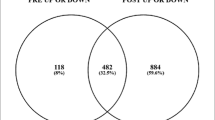Abstract
Background
Bariatric surgery can resolve type 2 diabetes in morbidly obese patients. However, the underlying mechanism is unknown. This study aimed to identify potential biomarkers or molecular pathways that are altered after bariatric surgery in diabetic and nondiabetic patients.
Methods
The study enrolled 17 morbidly obese patients undergoing bariatric surgery. Eight of the patients were diabetic, and nine were nondiabetic. In addition, a control group of four nonobese, nondiabetic volunteers was included. Patient blood samples were drawn before and after the operation. All blood samples were stabilized in Paxgene tubes (PreAnalytix). Total RNA was extracted and purified using the Paxgene Blood RNA Kit. For each sample, 100 ng of total RNA was amplified and labeled using the Ovation RNA Amplification System V2 with the Ovation Whole Blood reagent before hybridization to an Affymetrix Focus array containing more than 8,500 verified genes. Microarray results were analyzed with the GeneSpring GX 10.0 program, which uses an analysis of variance (ANOVA), and verified with real-time quantitative polymerase chain reaction (QPCR) using SYBR green (ABI).
Results
Microarray analysis showed that 167 genes were upregulated and 39 were downregulated in the obese diabetic patients. Preoperatively, adiponectin was downregulated 1.5-fold in diabetic versus nondiabetic patients. This was confirmed with quantitative PCR analysis. Preoperatively, morbidly obese patients showed a 3.12-fold downregulation of adiponectin expression versus the control group (p = 0.05). Interestingly, postoperative adiponectin levels were upregulated 2.79-fold (p = 0.02), which is close to the level of the normal control group.
Conclusions
Adiponectin is dysregulated in obese patients and significantly dysregulated in obese diabetic patients. These findings correlate with the association between low levels of adiponectin and a predisposition to insulin resistance or diabetes. The data suggest that reactivation of adiponectin expression may play a part in the resolution of type 2 diabetes after bariatric surgery. Therefore, targeting adiponectin may help to develop alternative treatments for diabetes.


Similar content being viewed by others
References
Zimmet P, Alberti KG, Shaw J (2001) Global and societal implications of the diabetes epidemic. Nature 414:782–787
Cowie CC, Rust KF, Byrd-Holt DD, Eberhardt MS, Flegal KM, Engelgau MM, Saydah SH, Williams DE, Geiss LS, Gregg EW (2006) Prevalence of diabetes and impaired fasting glucose in adults in the U.S. population: National Health And Nutrition Examination Survey 1999–2002. Diabetes Care 29:1263–1268
Mootha VK, Lindgren CM, Eriksson KF, Subramanian A, Sihag S, Lehar J, Puigserver P, Carlsson E, Ridderstrale M, Laurila E, Houstis N, Daly MJ, Patterson N, Mesirov JP, Golub TR, Tamayo P, Spiegelman B, Lander ES, Hirschhorn JN, Altshuler D, Groop LC (2003) PGC-1alpha-responsive genes involved in oxidative phosphorylation are coordinately downregulated in human diabetes. Nat Genet 34:267–273
U.S. Department of Health, Human Services, U.S. Department of Agriculture (2005) Dietary guidelines for Americans, 6th edn. U.S. Government Printing Office, Washington DC
Ogden CL, Carroll MD, Curtin LR, McDowell MA, Tabak CJ, Flegal KM (2006) Prevalence of overweight and obesity in the United States, 1999–2004. JAMA 295:1549–1555
Ogden CL, Yanovski SZ, Carroll MD, Flegal KM (2007) The epidemiology of obesity. Gastroenterology 132:2087–2102
Mokdad AH, Ford ES, Bowman BA, Dietz WH, Vinicor F, Bales VS, Marks JS (2003) Prevalence of obesity, diabetes, and obesity-related health risk factors, 2001. JAMA 289:76–79
Field AE, Coakley EH, Must A, Spadano JL, Laird N, Dietz WH, Rimm E, Colditz GA (2001) Impact of overweight on the risk of developing common chronic diseases during a 10-year period. Arch Intern Med 161:1581–1586
Colditz GA, Willett WC, Rotnitzky A, Manson JE (1995) Weight gain as a risk factor for clinical diabetes mellitus in women. Ann Intern Med 122:481–486
Oguma Y, Sesso HD, Paffenbarger RS Jr, Lee IM (2005) Weight change and risk of developing type 2 diabetes. Obes Res 13:945–951
Wannamethee SG, Lowe GD, Rumley A, Cherry L, Whincup PH, Sattar N (2007) Adipokines and risk of type 2 diabetes in older men. Diabetes Care 30:1200–1205
Buchwald H, Avidor Y, Braunwald E, Jensen MD, Pories W, Fahrbach K, Schoelles K (2004) Bariatric surgery: a systematic review and meta-analysis. JAMA 292:1724–1737
Sjostrom L, Lindroos AK, Peltonen M, Torgerson J, Bouchard C, Carlsson B, Dahlgren S, Larsson B, Narbro K, Sjostrom CD, Sullivan M, Wedel H (2004) Lifestyle, diabetes, and cardiovascular risk factors 10 years after bariatric surgery. N Engl J Med 351:2683–2693
Wang YX, Lee CH, Tiep S, Yu RT, Ham J, Kang H, Evans RM (2003) Peroxisome-proliferator-activated receptor delta activates fat metabolism to prevent obesity. Cell 113:159–170
Heuvel J (2007) The PPAR resource page. Biochim Biophys Acta 1771:1108–1112
Brody F, Hill S, Celenski S, Kar R, Kluk B, Pinzone J, Fu S (2007) Expression of ectonucleotide pyrophosphate phosphodiesterase and peroxisome proliferator activated receptor gamma in morbidly obese patients. Surg Endosc 21:941–944
Adams TD, Gress RE, Smith SC, Halverson RC, Simper SC, Rosamond WD, Lamonte MJ, Stroup AM, Hunt SC (2007) Long-term mortality after gastric bypass surgery. N Engl J Med 357:753–761
Lazar MA (2005) How obesity causes diabetes: not a tall tale. Science 307:373–375
Herbert A, Gerry NP, McQueen MB, Heid IM, Pfeufer A, Illig T, Wichmann HE, Meitinger T, Hunter D, Hu FB, Colditz G, Hinney A, Hebebrand J, Koberwitz K, Zhu X, Cooper R, Ardlie K, Lyon H, Hirschhorn JN, Laird NM, Lenburg ME, Lange C, Christman MFA (2006) Common genetic variant is associated with adult and childhood obesity. Science 312:279–283
Snijder MB, Heine RJ, Seidell JC, Bouter LM, Stehouwer CD, Nijpels G, Funahashi T, Matsuzawa Y, Shimomura I, Dekker JM (2006) Associations of adiponectin levels with incident impaired glucose metabolism and type 2 diabetes in older men and women: the Hoorn study. Diabetes Care 29:2498–2503
Disclosures
Katharine Hindle, Claire Edwards, Tim McCaffrey, Sidney W. Fu, and Fred Brody have no conflict of interests or financial ties to disclose regarding this report.
Author information
Authors and Affiliations
Corresponding author
Rights and permissions
About this article
Cite this article
Hindle, A.K., Edwards, C., McCaffrey, T. et al. Reactivation of adiponectin expression in obese patients after bariatric surgery. Surg Endosc 24, 1367–1373 (2010). https://doi.org/10.1007/s00464-009-0780-0
Received:
Accepted:
Published:
Issue Date:
DOI: https://doi.org/10.1007/s00464-009-0780-0




